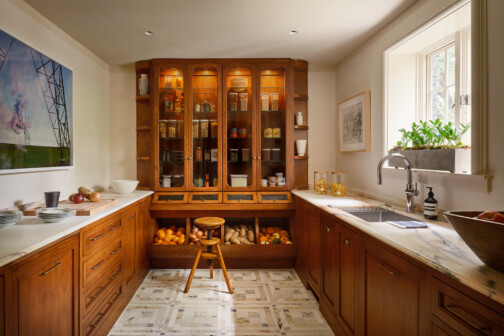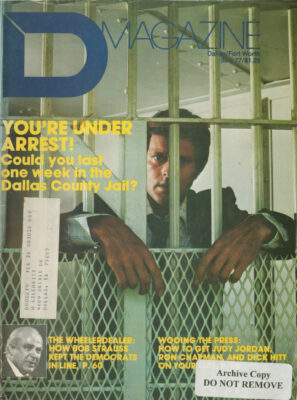You know, of course, that if you set your thermostat at 85 degrees this summer you could save a lot of money. You could also cut your utility bills if you increase the thickness of your walls from four inches to six and stuff them with insulation. But these remedies are either physically or financially unpleasant. There are ways to cut down on energy costs, though, that don’t hurt a bit, to say nothing of the contribution you’ll be making toward the cause of energy conservation.
Keep your cool. If you feel a draft through closed doors or windows, or if you can see light were you’re not supposed to, you’re losing your cool. Caulking and weatherstripping are great cost benefit remedies. You can caulk your windows for $3 each, and weatherstrip doors at $6 per door, saving yourself 15 percent or more on your air conditioning bill.
Don’t let your grass amass. This is a sleeper. If you mow without a grass catcher while your compressor is running, your air conditioning unit will suck up grass particles like a vacuum cleaner. The grass will cake along the coil vents and make your compressor work harder, maybe even burn it out.
Keep your screen clean. This chore will reward you with the greatest cost benefit of all. A 59¢ filter change in your air conditioning blower once a month will save big money on your cooling bill. The key is record keeping, or you will lose track of the last change. A sheet of paper taped on a two-by-four in the attic near the trap door is ideal.
Put a damper on things. Be sure your fireplace damper is closed unless you want to share your cool air with the chimney sweeps. If you don’t have a damper, get one, or insert a wood cover across the front of your fireplace and camouflage it with a bulky plant.
Spoil your coil. On real hot days, take your water hose and cool down the coils in your air conditioner. This will soothe your unit and keep it from overexerting itself.
A weed is an unloved flower. Be that as it may, if you can’t see your air conditioning unit for the Johnson grass, you’re in trouble. Your coils have to breathe, and if they can’t your compressor is going to be up all night spinning those four little wheels on your electric meter.
Give yourself a cold shoulder. Cold showers are healthy, invigorating and will help keep you out of hot water with your utility company, especially if you’re unlucky enough to have an electric water heater.
Don’t go near the water. At least not while you’re lathering up your body in the shower. If you’re not the healthy type, and you insist on a hot shower, turn off the water while you soap down. Otherwise all that expensive hot water is down the drain.
It’s sedimentary, Watson. Once or twice a year, drain a bucket or so of water off the bottom of your hot water heater. Sometimes sediment forms in the tank and insulates the water from the heat, wasting energy. Check your service manual or local dealer for proper draining procedures.
Let off a little steam. Have you ever thought how ridiculous it is to have hot water so scalding that you have to temper it with two parts of cold water to stand it? Check the temperature setting on your water heater. 120 degrees is plenty for normal usage. If you have a dishwasher though, you’re stuck with a need of at least 140 degrees. If your heater control isn’t described in degrees, a dealer can translate for you.
Is this drip really necessary? One drip of water from a leaky faucet per minute will amount to 700 gallons in a year. If you don’t believe it, try it sometime when you’re not busy. More vigorous leaks can amount to thousands of gallons annually. Hot water leaks are double trouble financially.
Do the soft shoe. This one is little short of a miracle. Your automobile gas consumption is cut drastically if you can learn how to soft pedal your accelerator. Practice letting up on the accelerator as far as you can without dropping speed. And don’t floor the accelerator when starting after a complete stop. The Chrysler Cordoba has a warning light that flashes when you accelerate too rapidly.
Stay in tune. This one is on the borderline of pain, with an auto tune-up costing about 40 bucks now. But it pays off. A poorly tuned engine is a gas guzzling disaster, and will decrease your gas mileage by 10 to 15 percent.
A little pot is good for you. An electric crock cooker will run ten hours for a nickel. And you don’t have to limit your cuisine to hamhock and beans. Crockery cookbooks contain recipes for more exotic dishes like chicken cacciatore these days.
Try to make things pan out. Another sleeper. It’s very important to fit the size of your pan to the size of the cooking grid. If the pan is too small, you’re heating the kitchen with the overlap. Too large a pan will strain the cooking unit. And fit the food to the pan. It should be nearly full for maximum efficiency.
Keep the lid on. Unless your recipe demands otherwise, keep the lid on your cooking pot. This gives you maximum benefit from the heat generated, not to mention a cooler kitchen. If the lid is inappropriate, turn on the stove exhaust and ship the heat outside.
Cook your food, don’t drown it. There is no need to use a gallon of water to boil an egg. Use smaller pans and don’t overfill. And there’s no use in creating a miniature Krakatoa – a slow boil will do just as well.
If you can’t stand the heat get it out of the kitchen. Backyard cookery is more than fashionable this time of year – it’s a big energy saver. Hour after hour of oven cookery is a real drag on your cooling system.
Separate your natural enemies. If you have flexibility in your kitchen arrangement, never position a refrigerator near an oven. A nearby oven will make a refrigerator work overtime.
Freeze your refrigerator costs. These are becoming big offenders, especially the side-by-sides with ice-makers. Give it the dollar bill test. Stick a dollar between the door and the body and shut the door. If the dollar slides out without resistance, your unit is not sealed properly. (The dollar test doesn’t work on magnetically sealed doors, but a good savings hint here as well as with rubber-sealed models is to decide what you want before you open the door.)
Strike while the oven is hot. When you do use your oven, use it fully, preferably cooking your whole meal in it, such as a meatloaf and a vegetable casserole. Don’t “over-pre-heat,” ten minutes is plenty. Turn it off just before your meal is ready, using the left-over heat to finish the main course and heat your bread.
Be a morning person. Do your oven cooking before your air conditioner wakes up. With your thermostat set at 78 degrees, when the inside morning temperature is 74, you can heat up the house by four degrees without disturbing old electricity eater.
Hang your dishes out to dry. Quite often there is no need to use the automatic dryer mechanism on yourdishwasher, especially after late evening washes. Turn the unit off after the wash cycle is completed and let nature do the rest. For safety’s sake, prop the door open just a few inches, rather than all the way.
Don’t look on the sunny side. It’s too late to grow towering oaks on the west side of your house, at least for this summer. But it will help if you will keep your draperies closed throughout the house, particularly in the area of the evening sun.
Consider the electric fan, how it saves. Not now, it’s too hot. Try one during summer phase-out in September and during phase-in next April and May. A 12″ portable electric fan runs four hours for a penny.
Don’t be aloof with your roof. Install a power ventilator. The cost (about $65), is more than compensated for by the energy savings. Electricity usage is negligible and it will do a fabulous job of blowing the hot air out of your attic. The wind-driven variety does a fine job except when you really need help, on the hot, humid days when the nearest breeze is somewhere between Amarillo and Dalhart.
Stay loaded. Your dishwasher, clothes washer and dryer work just as hard half loaded as full. Be more patient or get dirty faster. But don’t overload or you will strain the equipment.
Stay out of hot water. If you haven’t experimented with some of the new cold water detergents, now is the time to do so. If you can’t kick the hot water habit cold turkey, at least retreat to warm, if your washer is so equipped.
Keep an eye on the sneak heaters. Heat is generated in unsuspecting places such as your TV and stereo. And light bulbs devote more energy to producing heat than to lighting your path across the room.
Get our weekly recap
Brings new meaning to the phrase Sunday Funday. No spam, ever.
Related Articles

Government & Law
The Lawyer Who Landlords Don’t Want to See in Court
Attorney Mark Melton started helping people on Facebook during the pandemic. Before he knew it, he’d assembled the country’s only group of lawyers focused full time on stopping illegal evictions—and saving taxpayers millions.
By Matt Goodman

Home & Garden
Kitchen Confidential—The Return of the Scullery
The scullery is seeing a resurgence, allowing hosts and home chefs to put their best foot forward—and keep messes behind closed doors.
By Lydia Brooks



